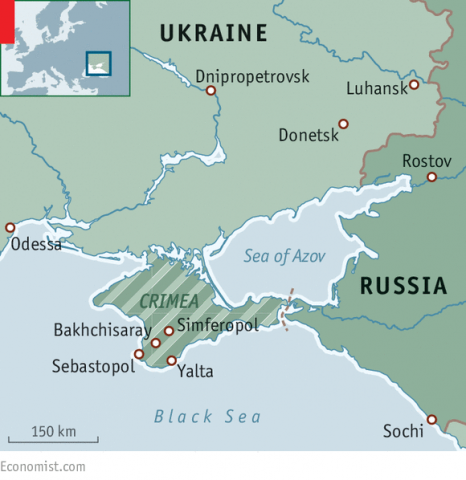ON May 14th Crimea’s indigenous Tatars sat glued to their screens, watching as Jamala, a Ukrainian singer of Tatar descent, won the Eurovision song contest. Jamala’s song “1944” commemorated Stalin’s brutal deportation of the entire Crimean Tatar population. For Russia’s government, the song was an infuriating breach of the contest’s ban on politics. For Tatars, it was a gesture of defiance. Most Tatars refuse to accept Russia’s annexation of the peninsula in 2014. As a result, they have been singled out for punishment.
In Crimea every Tatar family has stories of the deportation. Eighty-one-year-old Refat Selyamiev still clearly remembers May 18th, 1944, when Soviet soldiers came to his family’s house, led his mother and her three children out and brought them to a local cemetery. They expected to be murdered. Instead they, along with the rest of Crimea’s 200,000 Tatars, were taken to the train station, bundled into cattle cars and shipped to Uzbekistan. Stalin claimed the Tatars had collaborated with the Germans.
The trip took 18 days. Mr Selyamiev remembers the thirst, the diet of salted herring, and the dead (8,000 in total during the journey) being chucked out of carriages at train stops. Three months into the exile his mother died, aged 32. He was put into an orphanage. His father, who had been with the Soviet army fighting the Germans, came to collect him.
Mr Selyamiev’s latest experience of Russian state violence is much more recent. On February 12th a dozen armed men in balaclavas broke into his house, forced his son to the floor and placed his two grandsons facing the wall, guns pointed at their backs. Other armed men, accompanied by a dog, searched the premises. His son was taken to the police station, where he was interrogated over alleged sabotage of railway tracks, then released.
Crimean Tatars who refuse to accept Russian annexation see it as a continuation of Stalinism. (As if to prove them right, Russia’s Communist Party has peppered roadways with billboards featuring Stalin’s portrait and the words “It is our victory!”) Governed by Sergei Aksyonov, a Russian puppet nicknamed “Goblin”, the peninsula has become dangerous for the Tatars. Their houses and mosques have been searched and some of their men abducted, tortured and killed. The Mejlis, their representative body, has been outlawed. Some 15,000 have fled, mostly to Ukraine. Nariman Dzhelalov, the deputy head of the Mejlis, calls it a “hybrid deportation”—a reference to Vladimir Putin’s “hybrid war” of dirty tricks and disinformation when grabbing Crimea in the first place.
Russia has long practised similar methods in the North Caucasus. Abdurashid Dzhepparov, a Tatar activist whose son and nephew were abducted two years ago and never found, says the goal is either to intimidate or to provoke a revolt that would serve as a pretext for mass repression. Prosecutors have charged several observant Muslims with terrorism and adherence to Hizb ut-Tahrir, a pan-Islamic political organisation that was banned in Russia in 2004 but not in Ukraine. In an Orwellian twist, Tatars who opposed Russia’s annexation have been charged with “threatening Russian territorial integrity”.
The Russian government is also trying to co-opt Tatar leaders. A few members of the Mejlis have switched sides, launching a pro-government movement called Kyrym. Other Tatars face a difficult moral choice. Lenur Islyamov, once Crimea’s biggest businessman and the owner of ATR, the Tatars’ TV channel, has moved to Ukraine. He has organised a blockade of goods to Crimea and put together a military battalion which, he says, would be ready to defend Crimean Tatars.
On the other side, Remzi Ilyasov, a former Mejlis member, now serves as a vice-speaker of the Russian-installed Crimean parliament. He says the Tatars should accept Russian rule, and Mr Islyamov endangers the lives of ordinary Tatars.
Mustafa Dzhemilev, formerly the head of the Mejlis and, before that, the leader of a nonviolent Tatar resistance movement against Soviet rule, now lives in exile in Kiev, barred from entering his homeland. He is resolute: “If an enemy comes to your land, you have to resist.” Anyway, he argues improbably, it is only a matter of time before Crimea is returned to Ukraine. “The Soviet government was trying to break us but in the end broke up itself. And Russia is not even the Soviet Union.”
Source: The Economist




